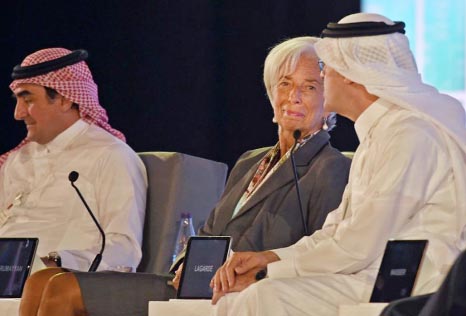
The world faces a “dark future” if it fails to tackle climate change and inequality, IMF managing director Christine Lagarde warned on Tuesday.
“If we don’t address these issues… we will be moving to a dark future” in 50 years, she told a major economic conference in the Saudi capital.
On climate change, Lagarde said that “we will be toasted, roasted and grilled” if the world fails to take “critical decisions” on the issue.
In 2015, around 195 nations signed the Paris climate agreement which set measures to reduce greenhouse gas emissions to prevent temperatures rising by more than two degrees in around 50 years.
But US President Donald Trump announced in June the start of a three-year process to pull out of the pact, arguing that it would put the US at an economic disadvantage. His move faced fierce criticism from world leaders and activists, with former UN secretary general Ban Ki-moon accusing Trump of “standing on the wrong side of history”.
Lagarde also called for tackling inequality between men and women and countries that are “haves” and those that are “have nots”.
If the world wants a future that “looks like utopia and not dystopia”, it needs to address such concerns, Lagarde said.
She predicted that in 50 years’ time, oil will be a secondary commodity.
Trump On ‘Wrong Side Of History’ On Climate: Former UN Chief Ban Ki-Moon
“I have been speaking out that his vision is politically short-sighted, and economically irresponsible and scientifically wrong. So he is standing on the wrong side of history,” Ban Ki-moon said on the sidelines of a London peace walk.
Meanwhile, a non-partisan federal watchdog says climate change is already costing U.S. taxpayers billions of dollars each year, with those costs expected to rise as devastating storms, floods, wildfires and droughts become more frequent in the coming decades.
A Government Accountability Office report released Monday said the federal government has spent more than $350 billion over the last decade on disaster assistance programs and losses from flood and crop insurance. That tally does not include the massive toll from this year’s three major hurricanes and wildfires, expected to be among the most costly in the nation’s history.
The report predicts these costs will only grow in the future, potentially reaching a budget busting $35 billion a year by 2050. The report says the federal government doesn’t effectively plan for these recurring costs, classifying the financial exposure from climate-related costs as “high risk.”
“The federal government has not undertaken strategic government-wide planning to manage climate risks by using information on the potential economic effects of climate change to identify significant risks and craft appropriate federal responses,” the study said. “By using such information, the federal government could take the initial step in establishing government-wide priorities to manage such risks.”
GAO undertook the study following a request from Republican Sen. Susan Collins of Maine and Sen. Maria Cantwell of Washington, the ranking Democrat on the Senate Committee on Energy and Natural Resources.
“This nonpartisan GAO report Senator Cantwell and I requested contains astonishing numbers about the consequences of climate change for our economy and for the federal budget in particular,” said Collins. “In Maine, our economy is inextricably linked to the environment.
We are experiencing a real change in the sea life, which has serious implications for the livelihoods of many people across our state, including those who work in our iconic lobster industry.”
The report’s authors reviewed 30 government and academic studies examining the national and regional impacts of climate change. They also interviewed 28 experts familiar with the strengths and limitations of the studies, which rely on future projections of climate impacts to estimate likely costs.
The report says the fiscal impacts of climate change are likely to vary widely by region. The Southeast is at increased risk because of coastal property that could be swamped by storm surge and sea level rise. The Northeast is also under threat from storm surge and sea level rise, though not as much as the Southeast.

